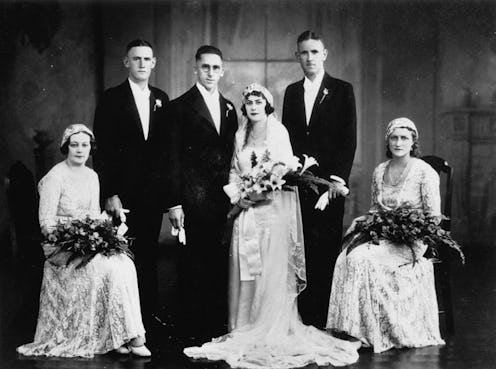Life
4 Bizarre Discoveries From The Science Of Marriage

You may think that a happy, satisfying marriage is a mystery, one held together by love, laundry, and a propensity to forgive each other for not doing the dishes. But you'd be wrong — at least, according to science. It turns out that there's been a huge amount of scientific research on the characteristics that create successful marriages, analyzing factors from sexuality to argument styles to how people spend money.
If you want to live your marriage in a scientific way, there are quite a lot of guides to help you do just that. Research indicates that you need to avoid contempt and embrace gratitude, for instance, which seems like common sense — though what that actually means in practice is up to your interpretation. (Hey, science can't do everything.) Of course, scientists have also developed some peculiar theories along the way — like an argument regarding why roller coasters are a good way to strengthen your marriage — as well as theories that have been discredited or discarded with the passage of time. But while scientific research about marriage can't always instruct us on exactly how to achieve marital bliss for ourselves, it can help us better understand changing perceptions and ideas about the institution.
Here are some of the most fascinating, odd and interesting discoveries in the history of marriage science.
1. Similar Money Habits Lead To A Happier Marriage
Partners who spend money in similar fashions are more likely to have successful marriages than those with radically different ones — but people with unusually thrifty or freewheeling spending habits tended to be attracted to people that were their polar opposite. This was established by a fascinating 2009 study conducted by the University of Michigan, and it set up an intimate understanding of what money can really do to marital relationships.
It turns out that people who are penny-pinching or extremely generous can often be attracted to partners with the opposite pattern: spendthrifts and Scrooges, in other words, tend to get together. However, marriages tend to be much happier if people don't follow this urge and instead marry those with similar spending patterns. The research found that initial attraction between incompatible spending patterns tended to eventually lead to fights and discord. So if you're attracted to somebody who hangs on to every dime while you're all about big purchases, beware.
2. A Marriage's Success Can Be Predicted By The Couple's Positive Interactions
Math, it turns out, does have a role in romance. A 2004 University of Washington study looked at videos of married couples having conversations about relationship problems, and came up with a mathematical model for the success or failure of their marriage. If the conversation had five positive "interactions" or more to every negative one, the relationship would be fine. If there were less than that, the relationship was likely to be in trouble, and the researchers found that ratio was able to depict the survival of the marriage with 94 percent accuracy. 5:1, it turns out, is the magic number.
A positive interaction is something like laughing, gentle teasing, touching one another or expressing something nice; even in the midst of a serious argument, successful marital partners were still capable of keeping things light and connected.
3. Going On Rollercoasters Together Will Improve Your Marriage
In Scientific American's hilarious and deeply interesting 2014 article "How To Craft An Empirically-Supported Marriage," an extremely interesting factor in relationship success is mentioned: going on rollercoasters or otherwise scaring yourselves together. This improves marriages because of a psychological process called "misattribution of arousal." Essentially, after a particularly intense or amped-up situation (like bungee-jumping or a very fast car ride), we're likely to be experiencing a lot of physical signs of heightened alertness, from an increase in blood pressure to faster breathing. Theoretically, if our spouse is around while we're feeling that, it's very likely that we'll interpret the sensation as attraction and jump their bones.
It's funny, but it also supposedly works: men who'd recently been on a suspension bridge were much more likely to approach and respond positively to an attractive woman immediately after, but none of them thought their attraction was down to their death-defying stunt. So the answer is clear: if you want to "spice up" your marriage, you need to get yourself a white-water raft, stat (Bustle is NOT responsible for anything that may happen after you procure said raft).
4. Cohabitation Doesn't Lead To Higher Divorce Rates
For a long time, it was part of accepted wisdom in American sociology that cohabiting before marriage was a bad idea — one that led to relationship breakdown and, ultimately, to divorce (that's what the marital research of the 1980s said, anyway). But while the "cohabitation effect" may have been real at the time, evidence is now suggesting that it has basically completely disappeared.
A 2014 study published in the Journal of Marriage and Family evaluated the trends around cohabitation and other factors in a relationship's success, and found that, as a society, we've moved on: cohabiting before marriage is now no longer a predictor of divorce. What's replaced it? Age. The younger you marry, the less likely you are to have a lasting marriage; the longer you wait, the more chance your marriage has.
Again, we can't all organize our lives around the conclusions of any one study. But it — like all of this research — is worth thinking about, especially within the context of the history of scientific research about marriage. There may be no way to discern the exact formula for a happy marriage — but that doesn't mean that we'll ever stop searching for one.
Images: Albert Lavignac, Conrad Poirier, Julia Margaret Cameron, The Intan, Pargon, State Library Of Queensland, Sidney Paget/Wikimedia Commons; Giphy